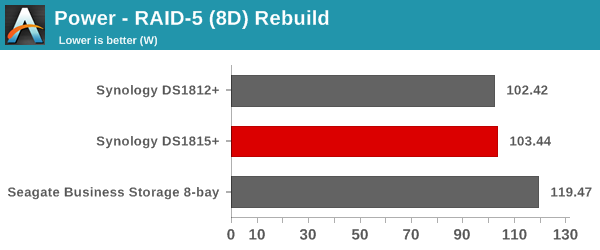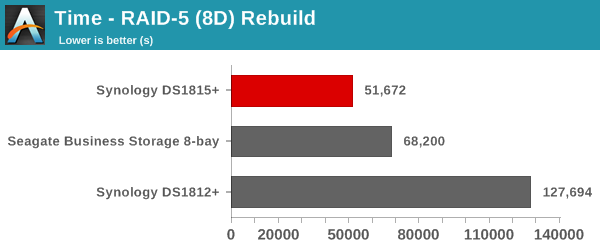Synology DS1815+ 8-bay Intel Rangeley SMB NAS Review
by Ganesh T S on November 18, 2014 6:30 AM ESTMiscellaneous Aspects and Final Words
In order to keep testing consistent across all 8-bay units, we performed all our expansion / rebuild testing as well as power consumption evaluation with the unit configured in RAID-5. The disks used for benchmarking (Western Digital WD4000FYYZ) were also used in this section. The table below presents the average power consumption of the unit as well as time taken for various RAID-related activities.
| Synology DS1815+ RAID Expansion and Rebuild / Power Consumption | ||
| Activity | Duration (HH:MM:SS) | Avg. Power (W) |
| Single Disk Init | 0:10:42 | 32.14 W |
| JBOD to RAID-1 Migration | 11:17:58 | 42.34 W |
| RAID-1 (2D) to RAID-5 (3D) Migration | 35:53:15 | 51.68 W |
| RAID-5 (3D) to RAID-5 (4D) Expansion | 25:1:4 | 62.48 W |
| RAID-5 (4D) to RAID-5 (5D) Expansion | 23:32:53 | 73.78 W |
| RAID-5 (5D) to RAID-5 (6D) Expansion | 23:6:12 | 84.07 W |
| RAID-5 (6D) to RAID-5 (7D) Expansion | 24:28:29 | 94.58 W |
| RAID-5 (7D) to RAID-5 (8D) Expansion | 27:7:26 | 104.72 W |
| RAID-5 (8D) Rebuild | 14:21:12 | 103.44 W |
The graphs below show the power consumption and rebuild duration when repairing a RAID-5 volume for the various 8-bay NAS units that have been evaluated before.

Even though the DS1815+ is not as power efficient as the DS1812+, the unit turns out to be better by a huge margin thanks to the cut-down in the rebuild duration. That said, it does look like Synology can optimize RAID rebuild and expansion durations further.

Concluding Remarks
The SMB / SOHO / prosumer COTS NAS market is interestingly poised. With the previous generation Atom platforms, NAS vendors had to differentiate themselves with the software. However, with their 22nm silicon, Intel has provided them with multiple options. We have already looked at QNAP using Bay Trail-D with extra focus on the multimedia transcoding and virtualization aspects. Asustor has opted to go the Haswell route, with a Core i3 CPU for the 70-series. With the DSx15+ series, Synology has placed its bets on the Intel Rangeley platform.
The new Rangeley platform has made up for the drawbacks of the previous generation x86 platforms at this price point. Equipped with the Atom C2538, the DS1815+ excels in three areas: multi-client performance, encryption capabilities and power efficiency. Synology's DSM is quite mature and it has no problems in bringing out the potential of Intel's Rangeley for the NAS market. The latest version of DSM brings deeper cloud integration (more cloud vendors supported for backup), better sync control, an advanced multi-platform note-taking solution in Note Stations / DS Note and improved security features (such as digital signing for packages). For the SMB market that Synology is targeting with the DS1815+, DSM 5.1 also brings SSD caching to high-availability clusters, VMware VAAI for NFS (in addition to the already existing iSCSI support) and scheduled iSCSI LUN snapshots.
Multi-client performance in terms of average response times is better because of the highly integrated I/O compared to other solutions which use bridge chips and have bottlenecks in connecting to the CPU. The appearance of AES-NI in the Atom-class SoCs has finally delivered power efficient encryption capabilities. Obviously, the 22 nm fabrication process as well as tight I/O integration greatly help in reducing the power consumption of the platform compared to other solutions in the market.
The above advantages aside, there are certain areas where Synology could improve:
- The DS1815+ needs to ship with 4 GB of RAM by default. Users running multiple apps would benefit tremendously.
- Even though the iSCSI feature set is quite advanced and ahead of the competitors, performance for the 'multiple LUNs on RAID' case could do with some improvement
- In terms of hardware / chassis design, a USB port (even 2.0 would suffice) on the front would be nice to have.
At $1050 for a diskless unit, the pricing is not unreasonable (given the premiums usually associated with Synology units). The Atom C2538 is one of the more powerful Rangeley SoCs and it helps the DS1815+ pack quite a punch for the SMB / SOHO market. We will shortly be reviewing a couple of 8-bay NAS units from other vendors. They will help us get a better understanding of where the DS1815+ stands when contemporary NAS units are taken into consideration.










65 Comments
View All Comments
stevenrix - Thursday, November 20, 2014 - link
I actually own the DS1812+. I was going to build my own NAS but I wanted a hardware solution for the RAID, because software RAID is just too slow. Then I could not find the right type of tower I wanted for the drives, that was another issue, then I was not able to expand the RAID on the fly if I wanted to add more drives or even build a dynamic partition, so I decided to go with that solution instead. I haven't got one single problem with my unit that just reached 1 year now.There are far better solution in NAS but their price is extremely expensive, starting at 50K like the Equal Logics. This solution is for SMB or people like me that don't want to spend time on assembling parts for a NAS. Also for a good NAS with good parts might cost more money: just the RAID card in hardware (PERC 6 or 7) is $300 and some NAS run with Xeons procs.
meyergru - Sunday, November 23, 2014 - link
I have read the reviews about the Synology NAS devices with Avoton CPUs (DS1815+ and DS415+). Having bought one now myself, I wonder how far they have been tested.I got the impression from former Anandtech articles about the new Avoton CPUs, that NAS devices equipped with those should be able to encrypt data with virtually no performance impact. The reviews proved that point, so I bought one.
However, Synology offers only eCryptFS, which does not work via NFS and exhibits the file names and directory structures in the clear - also, the maximum filename lengths are truncated to 143 characters. Thus, using it for general backup purposes is somewhat pointless.
On a side note, it is a shame that the Synology kernel configuration does not even include the dm-crypt.ko and cryptoloop.ko modules and that there are no userspace cryptsetup or losetup executables. This limits the usefulness of the Synology Avoton line of products to almost zilch.
Also, the GPL sources under http://sourceforge.net/projects/dsgpl are out of date. There is no 5.1 version, which would contain the neccessary tools for the new Avoton machines like the DS1815+ and the DS415+. Thus, there is no self-cure for the situation, either.
This is the kind of improvement hints I have grown accustomed to in Anandtech reviews, but no word of it in the final words of these ones.
name99 - Tuesday, November 25, 2014 - link
"Bay Trail is proving very effective in tablets"Seriously? Proof ...
Being used for such well known brands as Teclast and Onda and Voyo is not "proving very effective".
Intel's goal for 2014 was 40 million tablets. I'm guessing, since we haven't heard much since that goal was set (but we have heard about the 2014 billion dollar losses in their mobile division, complementing the 2013 billion dollar losses) that they didn't QUITE make that...
The Foxconn (oops, sorry, "Nokia") iPad mini clone MAY change that --- but that won't ship for another three months, and I expect Apple have a plan in the wings the moment they feel any pressure at the low-end to drop the A5 iPad mini, move the iPad mini 2 down to that price slot, and, if necessary, slide in an A8 based iPaid mini 4 at the high end...
Meanwhile Lenovo was so impressed with Bay Trail that they dropped it from the Yoga for the (much more expensive) Broadwell-Y, not that that has done them any good...
yuanshec - Tuesday, November 25, 2014 - link
I recently search for a NAS and find this category is actually the most overpriced stuffs in the consumer market nowadays. There are not much hard technology needed to build one and the actual cost is not expensive. And I don't see much power saving compare to a dedicated computer with RAID, and this is not quiet at all. The only possible reason that this high price tag existed is there are not many players (yet) on the market.I would suggested waiting one more year and see what happens. Compared to this, even Macs or iPhone are not overpriced at all...agodzilla - Friday, August 19, 2016 - link
Synology DS1815+ only SATA / 1.5 Gbps speed will be newsin the spec DS1815+ have sata2 * 8
but slot 7 and slot 8 can't over the 1.5 Gbps (SATA1)
even SSD still can't over the 1.5 Gbps (150MB/s)
they not tell this problem before consumer buy it,is illegal in your country?
if the consumer know slot 7 and slot 8 can't over the 1.5 Gbps,they maybe not buy this product
this is our test video https://youtu.be/YDyEZKT_nAQ
you can confirm by yourself ,if you have DS1815+
and DS1813+ same problem ,is so many years
this will be big news,make Synology say sorry and compensate